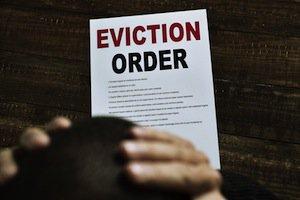The Eviction Process in Illinois
 Many people invest in rental property with the idea that the income the property generates will help with current living expenses and will be a source of income when the owners are ready to retire. Moreover, the majority of renters are good tenants who pay their rent on time and are respectful of the property they are renting. However, what happens when a property owner has a tenant who does not pay their rent or destroys the property? What are a landlord's options?
Many people invest in rental property with the idea that the income the property generates will help with current living expenses and will be a source of income when the owners are ready to retire. Moreover, the majority of renters are good tenants who pay their rent on time and are respectful of the property they are renting. However, what happens when a property owner has a tenant who does not pay their rent or destroys the property? What are a landlord's options?
When a landlord is having an issue with a tenant and wants the tenant out of the property, then he or she must first determine whether or not he or she even has the right to evict. You cannot evict a tenant just because you do not like him or her. This is especially true if there is an existing lease.
A landlord can petition to have a tenant evicted if he or she refuses to leave after the lease has expired. A landlord can also petition to have a tenant evicted if he or she has not paid rent. One exception to note in this situation, however, is there are incidents where a tenant refuses to pay the rent because of the landlord's failure to make repairs, or for other valid reasons. If this is the case, then the tenant must place the funds in an escrow account and notify the landlord of what he or she is doing and why.
A landlord can also have a tenant evicted if the individual is destroying the property or is causing a disturbance. For example, a tenant who is involved in drug dealing or other illegal activity that is taking place on the property can result in an eviction.
The reason why a tenant is being evicted determines what steps the landlord must take to begin the process. In cases where a tenant is not paying his or her rent, the landlord must serve the tenant with a five-day notice to quit—the tenant has five days to pay the back rent owed in full.
In situations where the tenant has violated the lease or other reason besides failure to pay rent, the tenant will be served with a 10-day notice to move out of the property.
Once the five or 10 days has passed, if the tenant has not complied, then the property owner can file an eviction lawsuit with the county court in which the property is located. At the hearing, both the landlord and tenant have an opportunity to present their side. If the court rules in favor of the landlord, the court will issue a written Order of Possession. This order will typically give a deadline of when the tenant must vacate the premises, as well as any other damages the tenant owes, such as back rent, the landlord's attorney fees, and court costs.
If the tenant has not left the property by the court's deadline, the landlord can then give the county sheriff's office the order of possession and the sheriff's office will forcibly remove the tenant.
It is important to follow the letter of the law when attempting to have a tenant evicted—if you miss a step, then the court could dismiss your case and you would have to begin the proceeding all over again. Therefore, any property owner dealing with a difficult tenant should contact an experienced DuPage County real estate attorney for help. Call Stock, Carlson & Asso. LLC at 630-665-2500 to schedule your consultation today.
Sources:
http://www.ilga.gov/legislation/ilcs/ilcs4.asp?ActID=2017&ChapterID=56&SeqStart=69100000&SeqEnd=71200000
http://www.moneycrashers.com/how-to-evict-tenant-eviction-process/

 630-665-2500
630-665-2500







